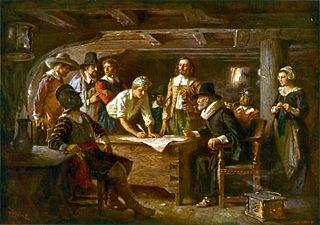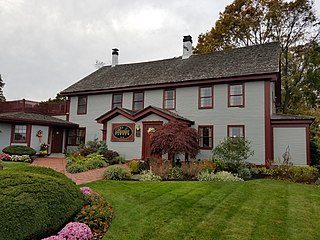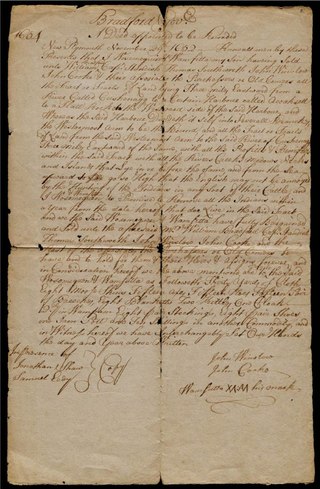

Churchill House is a historic seventeenth-century house (circa 1662) located at 250 Sandwich Street, Plymouth, Massachusetts.


Churchill House is a historic seventeenth-century house (circa 1662) located at 250 Sandwich Street, Plymouth, Massachusetts.
According to one source, "[t]he Churchill family arrived in the neighborhood as early as 1643 when John Churchill settled east of Sandwich Street." [1] Churchill House was originally believed to have been the home of John's son, Joseph Churchill, and built between 1672 and 1695, [2] but dendrochronology in 2022 shows that the earliest part of the house was built around 1662.
The house is currently owned by Elizabeth Creeden [3] who has owned the property since 1964 when she and her husband John [4] acquired it from Lewis Morton, who acquired it from Edward W. Bradford in 1954. [5] Bradford acquired it from Arthur Finney in 1924. [6]
By the 1970s the owners of Churchill house "uncover[ed] within the shell of the late eighteenth-or early nineteenth-century-appearing house at 250 Sandwich Street in Plymouth of a story-and-a-half seventeenth-century planked frame with crossed summer beams". [7] In 2022 dendrochronologists discovered that beams from the oldest portion of the house were felled in the 1650s and in 1661 or 1662, likely making it the oldest house in Plymouth verified with dendrochronology (as well as the third oldest verified in Massachusetts) according to Professor J. Ritchie Garrison who said "the results are indisputable" and will be presented at the 2023 Vernacular Architecture Forum in Plymouth. [8] According to the survey "[t]he south side of the house was the original front, and just inside the door is a small landing and a staircase that leads straight up to a second floor. The original roof beams as well as a slightly later addition that raised the height of the roof are still visible in the stairwell. The paneling that formed the original walls is still there too." [9]

Norfolk County is located in the U.S. state of Massachusetts. At the 2020 census, the population was 725,981. Its county seat is Dedham. It is the fourth most populous county in the United States whose county seat is neither a city nor a borough, and it is the second most populous county that has a county seat at a town. The county was named after the English county of the same name. Two towns, Cohasset and Brookline, are exclaves.

Plymouth County is a county in the U.S. state of Massachusetts, south of Boston. As of the 2020 census, the population was 530,819. Its county seats are Plymouth and Brockton. In 1685, the county was created by the Plymouth General Court, the legislature of Plymouth Colony, predating its annexation by the Massachusetts Bay Colony.

Sandwich is a town in Barnstable County, Massachusetts and is the oldest town on Cape Cod. The town motto is Post tot Naufracia Portus, "after so many shipwrecks, a haven". The population was 20,259 at the 2020 census.

Plymouth is a town and county seat of Plymouth County, Massachusetts, United States. Located in Greater Boston, the town holds a place of great prominence in American history, folklore, and culture, and is known as "America's Hometown". Plymouth was the site of the colony founded in 1620 by the Mayflower Pilgrims, where New England was first established. It is the oldest municipality in New England and one of the oldest in the United States. The town has served as the location of several prominent events, one of the more notable being the First Thanksgiving feast. Plymouth served as the capital of Plymouth Colony from its founding in 1620 until the colony's merger with the Massachusetts Bay Colony in 1691. The English explorer John Smith named the area Plymouth and the region 'New England' during his voyage of 1614. It was a later coincidence that, after an aborted attempt to make the 1620 trans-Atlantic crossing from Southampton, the Mayflower finally set sail for America from Plymouth, England.

The Reverend James Keith Parsonage, sometimes simply called the Keith House, is a 17th-century parsonage owned and maintained by the Old Bridgewater Historical Society (OBHS) in West Bridgewater, Massachusetts. It is located at 199 River Street, and is thought to be the oldest remaining parsonage in the United States.

Edward Doty was a passenger on the 1620 voyage of the Mayflower to North America; he was one of the signers of the Mayflower Compact.

First Period is an American architecture style originating between approximately 1626 and 1725, used primarily by British colonists during the settlement of the British colonies of North America, particularly in Massachusetts and Virginia. Among U.S. counties, Essex County, Massachusetts has the highest number of preserved First Period architecture buildings.

The Harlow Old Fort House is a First Period historic house at 119 Sandwich Street in Plymouth, Massachusetts.

Chickatawbut was the sachem, or leader, of a large group of indigenous people known as the Massachusett tribe in what is now eastern Massachusetts, United States, during the initial period of English settlement in the region in the early seventeenth century.

The Sparrow-Hawk was a 'small pinnace' similar to the full-rigged pinnace Virginia that sailed for the English Colonies in June 1626. She is the earliest ship to participate in the first decades of English settlement in the New World to have survived to the present day.

The Pickman House is a first period structure located on Charter Street in Salem, Massachusetts, behind the Peabody Essex Museum. As no published dendrochronology study has been done, the exact build date of this home is disputed. In either case the house is thought to have stood during the Salem witch trials of 1692 and 1693. The house is now part of a group of properties that form the Charter Street Historic District. It has been described by the Massachusetts Historical Commission as a rare surviving example of 17th century architecture.
William Bassett was an English artisan, a migrant to North America.

Williams–Barker House is an historic building on Barker Road in Scituate, Massachusetts. The core of house is believed to date from 1634 when it was constructed by John Williams who had emigrated from England. The construction date of the building has not yet been verified through dendrochronology.

The Feake–Ferris House is a historic structure at 181 Shore Road in Old Greenwich, Connecticut. The building was purportedly built around 1645 and was expanded over time to its present saltbox shape.
Scraggy Neck is a peninsula in Buzzards Bay south of the Cape Cod Canal, in Cataumet, Massachusetts, USA. It is south of Wings Neck and southeast of Bassetts Island.
This article attempts to list the oldest houses built in the Commonwealth of Massachusetts, United States from settlement to 1659. The first immigrant houses built in the Plymouth and Massachusetts Bay colony are known as first generation structures. These were built upon settlement (1620) until about 1660 "when the first immigrant generation of preponderantly younger settlers had come to full maturity". While dozens of existing homes are thought to have been built before 1660, proving their age scientifically is another matter. Just one example built during this time period known as the Fairbanks House has been proven through dendrochronology. The rest of the examples are approximate and based on architectural studies and historical records. Its estimated that only five houses in total have been documented enough to firmly establish they were built during this time period. Only First Period houses built prior to 1660 are suitable for inclusion on this list as construction methods changed circa 1660. All entries should include citation with reference to: 17th century architectural features; a report by an architectural historian; or dendrochronology whenever possible.

Old Dartmouth was the first area of Southeastern Massachusetts settled by Europeans. It was purchased on behalf of the Plymouth Colony in 1652 from the indigenous Wampanoag people. The lands included all of modern-day Dartmouth, New Bedford, Westport, Fairhaven, and Acushnet in current day Massachusetts, as well as parts of modern Tiverton and Little Compton In Rhode Island, an area of around 145,000 individuals in the modern area.